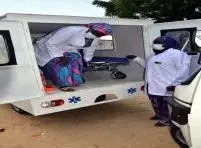UNFPA, KOICA project to the improved health status of women and children in August 2020 despite COVID
The UNFPA supported the KOICA project in the month of august recorded numerous achievements in the areas of Comprehensive maternal and child health, Comprehensive fistula care, and Built capacity of the Results-based data management system.
Comprehensive maternal and child health
The project Procured 10 mini ambulance to strengthen maternal and child healthcare intervention, through enhancing access and supporting other SRH/GBV referrals within hard-to-reach and scattered settlements of Konduga, MMC, Jere, and part of Mafa local government areas of Borno state
Fourteen (14) ambulance riders were trained on basic sexual reproductive services, identification of danger signs in pregnancy, gender-based violence guiding principles including protection from sexual exploitation and abuse, and how best to provide emergency support to women and girls in a different location.
28 stakeholders attended three days of maternal perinatal dead review and response (MPDSR) meeting at the state level aimed at reducing maternal and child mortality and morbidity 28 stakeholders in attendance.
During this period about 5,914 persons were reached with SRH services and life-saving information, including customized COVID-19 infection prevention and control messages by the mobile medical
Another 3,336 were reached with direct SRH services (ANC, clean deliveries, PNC, FP, and treatment of STI/HIV) in UNFPA supported facilities. 2,315 survivors of violence community members reached with the need-based and culturally sensitive group and individual psychosocial support in UNFPA supported safe spaces and women empowerment Centres in the MMC, Jere, and Konduga LGAs. Some 8,578, community members in three LGAs were reached with key GBV messages on prevention/mitigation, access to services as well as COVID-19 infection prevention and control.


